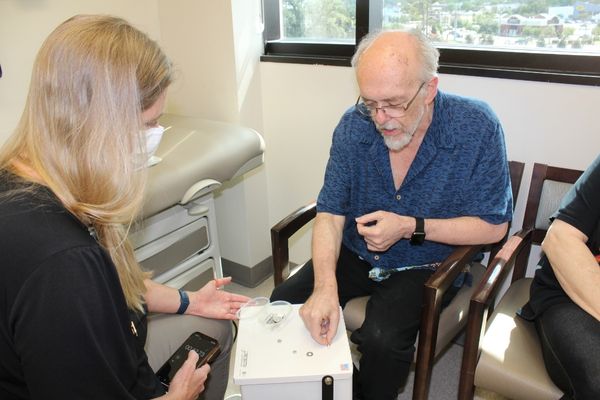Neuro, Rehab combine talents to better serve patients with Parkinson’s Disease and tremors

Neuro specialists and Rehabilitation Services associates have teamed up to provide a multidisciplinary clinic designed to enhance quality of care for people diagnosed with Parkinson’s Disease (PD), Essential Tremor (ET) and Dystonia. The busy clinic has drawn patients from throughout Northwest Florida.
The clinic is just one of a few in the U.S., according to Dr. Deborah Boland, a neurologist at who specializes in movement disorders. Dr. Boland and Dr. Ann Carr, neurosurgeon, both with The Advanced Brain & Spine Institute at ASH Pensacola, were the first to perform Deep Brain Stimulation surgery (DBS) at ASH Pensacola in October 2021. The new clinic supports many DBS patients.
DBS delivers electrical impulses to targeted areas of the brain that are responsible for movement disorders that include tremor, stiffness, slowness and dystonic postures. These electrodes create impulses that can help regulate the abnormal brain activity that causes symptoms that greatly affect patients’ daily lives.
“Embarrassing” and “annoying” are some of the words patients use to describe dealing with uncontrollable shaking. The shaking can range from mild to severe. “I shook so bad that I got to the point where I had to use both hands just to hold a spoon steady,” said Wanda Corbin of Pensacola, who has suffered with a tremor in her right hand for 15 years. She said she was afraid to cook chicken for fear of accidentally dropping it into hot grease, was unable to apply make-up and no longer wanted to eat out in restaurants. Tremors can also impact a person’s social life, contributing to a sense of isolation.
Some patients like Tim Hamon, who has PD, may experience difficulty walking due to the shuffling symptom associated with the disease. Tim, who also experiences shaking in his left leg, traveled an hour and a half from South Walton County to participate in a recent clinic. “Dealing with Parkinson’s is just irritating; it’s hard to get things done,” said Tim. He is looking forward to working and traveling abroad again once his symptoms are under control.

Tim Hamon
After recently undergoing DBS, he was at the clinic to have two leads programmed. Later, via a virtual visit, Dr. Boland can even adjust the settings of electrical flow while Tim remains in the comfort of his own home. In fact, any of their patients who live in Florida can receive care at home from this team through virtual appointments.
In many cases for PD and ET, two leads are implanted in the brain to control symptoms, as in Tim‘s case. Dr. Boland said: “When programming these leads, we use the foundation principles behind the science of neuromodulation, but make every attempt to spend adequate time as a multidisciplinary team to eloquently individualize each patient‘s programming, in order to optimize their individual problems, blending the art and science of medicine.“
If the original electrical-impulse program settings are too high, they may cause walking, swallowing, language and/or voice problems. To assess whether fine tuning of the electrical impulses is needed, the doctors created the multidisciplinary pre- and post-op assessment clinic that provides several assessments in one, convenient location for patients. Physical therapy, occupational therapy and speech therapy associates are on site every third Friday of the month to provide individualized assessments.
During a typical clinic, the team may see four pre-op patients, four post-op patients and eight to 10 patients needing follow-up assessments for programming adjustments. For example, Juan Suarez, Speech Pathologist, provides testing that assesses whether the patient’s voice is loud enough, the ability to “find the words” they need to communicate and swallowing issues, while Laurie Battle, OT, looks at fine-motor skills such as the ability to pick up small items and perform other tasks. Elizabeth Pereria, PT, puts patients through a walking exercise to assess gait.
A former physical therapist, Dr. Boland approached Ashley Kelley, Outpatient Rehab Manager-Grande Drive, and her team with the idea of the clinic. “We had already introduced a successful Parkinson’s Support Group and were looking to expand our outreach to this underserved patient population,” said Ashley. “The collaboration among the neurologist, neurosurgeon, physical therapist, occupational therapist, and speech therapist has fostered the sharing of knowledge, ideas and treatment to provide the best outcomes for these patients.”
“We are thankful for the Administration's support of this clinic and to Ashley and her team for their willingness to participate and support our patients,” said Dr. Boland.
Last updated: October 3, 2022